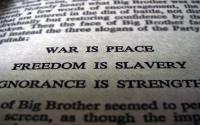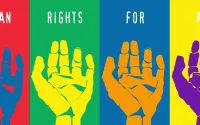Published on Thursday, January 2, 2003 by the International Herald TribuneCommon Dreams
A nation with the power and ambition of today's United States owes it to itself, and to the world, to know facts. Knowing what actually happened, rather than myths about what happened, would seem essential to avoiding error about what may happen in the future.
First are facts about U.S. history, as applied to policy choices. A policy paper issued by the influential American Enterprise Institute recently compared President George W. Bush's opportunity in going to war with Iraq with Abraham Lincoln's opportunity in the Civil War.
What began for Lincoln as a simple military intervention to restore the Union became, the paper argued, a great undertaking to emancipate slaves and guarantee their liberty as freedmen. It concluded that Bush must today do the same thing: liberate the Iraqis and (paraphrasing what Bush has already promised) stabilize and democratize "the greater Islamic world."
Under Lincoln's successors, the slaves emancipated during the American Civil War were driven from state government assemblies and deprived of the vote by intimidation, property-qualification laws and poll taxes.
By the turn of the century, a system of racial segregation and invidious discrimination was in place in the United States that lasted until a century after Lincoln's death.
Lyndon Johnson's civil rights legislation in the 1960s came as close as America has yet come - which is not that close - to accomplishing for American society itself what the Bush administration now claims to offer "the greater Islamic world."
A senior White House official was quoted last week in The Washington Post as saying that the United States has assumed "an almost imperial role" today because its responsibilities are the same as when America was "standing between Nazi Germany and a takeover of all Europe."
Britain, not the United States, stood between the Nazis and the takeover of all Europe. The United States did nothing substantial to oppose the Nazis until 1942. Churchill pleaded for help, but an isolationist Congress denied it.
Jews fleeing Germany were refused American refuge. The U.S. government rejected a French government appeal for help in June 1940. The French republic collapsed and the Battle of Britain began. A handful of American volunteers went to join the Royal Air Force's Eagle Squadron.
The only practical aid for Britain that President Franklin Roosevelt was able to get from an isolationist Congress was to exchange 50 obsolete destroyers for 99-year leases on British bases in the Western Hemisphere. Lend-lease was a system of war supplies delivered on credit, which Congress demanded be eventually repaid (and much was, which is one reason the British Empire came to an end after 1945). Even after the Japanese attack on Pearl Harbor, the United States did not immediately declare war on Germany. It did so three days later, after Germany had declared war on the United States.
Look back a century. In January 1903, the world was at peace and Britain was the sole superpower. It was the greatest empire ever known. Britain's First Lord of the Admiralty in 1903 would have looked with contempt at the feeble "rogue states" that preoccupy Defense Secretary Donald Rumsfeld and Vice President Dick Cheney.
Britain had not only the capacity to wage simultaneous naval wars against its two greatest rivals, France and Germany, but could have fought the combined navies of the United States, Germany, and Russia.
The Boer War had been settled the previous May, after nearly 6,000 British casualties and 16,000 losses to disease, as against Boer losses of 4,000. (This was the British Empire's Vietnam war - an intimation of decline.)
The great-power peace of 1903 was to end in 1904, when Japan, with its five battleships, went to war with Russia and sank virtually the entire Russian fleet. The first Russian revolution followed.
Also in 1903, the Russian Social Democratic Party split into Menshevik and Bolshevik factions, the latter led by Lenin.
Thirty-six years later, Lenin's Russia joined Nazi Germany to divide and conquer Europe, followed by Nazi Germany's attempt to destroy Soviet Russia. Two years after that, in a campaign lasting five months, Japanese naval air power drove all the great powers out of the western Pacific - ending colonialism by doing so, and bringing the United States into the world crisis.
Four years later the United States, essentially unharmed, more powerful than it was before the war, picked up the pieces. The United States is where it is today because of what other nations did to ruin themselves. Being the world's sole superpower is not a permanent appointment.






